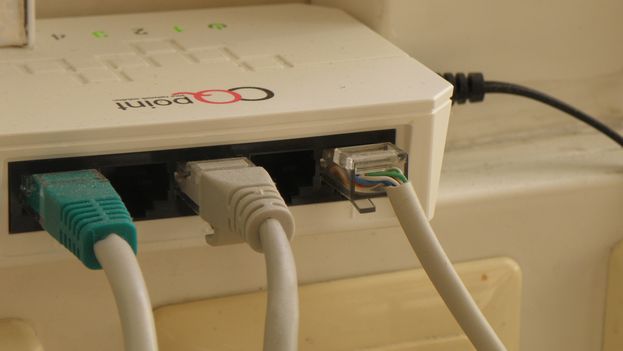
![]() 14ymedio, Regina Coyula, Havana, 25 May 2016 — For Cubans who update their domestic entertainment weekly with the now famous, private and anonymous “Weekly Packet,” a subtitle in bright greenish-yellow letters at the beginning of movies has become familiar. It is the ever present www.gnaula.nu, which appears so frequently that it spurred my curiosity: I found it impossible to recognize what country corresponded to the extension “.nu” so I turned to the always useful Wikipedia.
14ymedio, Regina Coyula, Havana, 25 May 2016 — For Cubans who update their domestic entertainment weekly with the now famous, private and anonymous “Weekly Packet,” a subtitle in bright greenish-yellow letters at the beginning of movies has become familiar. It is the ever present www.gnaula.nu, which appears so frequently that it spurred my curiosity: I found it impossible to recognize what country corresponded to the extension “.nu” so I turned to the always useful Wikipedia.
Surprise. The country where all the movies we watch at home are pirated is Niue, an atoll with the pretensions of a little island, attached to New Zealand. In 1996, an American (who of course doesn’t live in Niue) took the rights to “.nu” and in 2003 founded the Niue Internet Society, and offered to the local authorities to convert the quasi-island into the first wifi nation of the world. The offer was rounded out with a free computer for every child. Nothing spectacular; we’re talking about a population of barely 1,300 people.
The irony is that while “.nu” generates enormous profits, the inhabitants of Niue who want to connect from home and not from the only internet café are obliged to pay for installation and service.
So I find another curiosity: the second most used internet extension after “.com” corresponds to another little place in the corner of the Pacific, also unnoticed, a group of islets of roughly four square miles. Tokelau is the name of this place whose domain “.tk” hatched in 2009 and was free, and today it is the virtual home of hundreds of thousands of sites of dubious probity.
The way in which the territorial domains of each country (ccTLD, which stands for: country-code-top-level-domain) are managed is very different. The Internet Corporation for Assigned Names and Numbers (ICANN) has left the who and how to the discretion of each country. Many countries have privatized it either in the hands of institutions or companies created for that purpose, while in others it is done by an entity attached to a stage agency.
The two ways of operating ccTLDs have advantages and disadvantaged. Deregulating the extensions tips the balance toward the more profitable companies to the detriment of the agencies, NGOs and social and cultural institutions. Decreasing the influence of governments, can weigh heavily on the sovereignty of countries with fragile economies or small and young countries.
As a counterpart, state-regulation administration tends to protect social and cultural interests, a successful management style that can lead to gains that positively impact national life. It can also happen that the process for buying a ccTLD are restrictive or discriminatory, sheltering under deliberately vague rules to be applied at their discretion, as is the case with Cuba’s “.cu”.
In Latin America, Argentina is the only country that offers a site for free; hence the millions of sites with the extension “.ar”. This gratuity is about to change because a way to collect payments is being studied. In Chile and Nicaragua domains are administered through public universities. In Guatemala it is also done through a university but in that case a private one.
State regulation occurs in Venezuela through the National Telecommunications Commission (Conatel), and in Cuba through the Information Technologies and Advanced Telematic Services Company (CITMATEL).
Colombia, and without going into details about its antecedents, is a reflection of a similar debate ongoing in many countries. A private company owns its ccTLD and they believe that the fact that 89% of the owners of a “.co” site are foreigners living outside the country, far from violating national identity, internationalizes Colombia and brings its brand to the entire world. What underlies these debates is that the market is imposed on cultural values and little can be done in the defense of an intangible patrimony.
But ultimately, who governs the Internet? Any observant newcomer claims that the United States governs it. On its territory are the institutions and the majority of the servers intended to organize what would otherwise be chaos.
The now well-known ICANN assigns domain names (DNS) to IP addresses, has a contract with the government and is located in California. Very influential internet companies such as Microsoft, Google and Amazon are also American. By September there will be news of a change; simply that ICANN will be independent of the United States Department of Commerce.
In this asymmetric influence are counterpoised the interest of other parties involved and also of the internet. International organizations such as those dealing with trade (the ITO), intellectual property and the International Communications Union have been involved in conjunction with ICANN. Virtual space modifies the notion of sovereignty, with added risks to equality and diversity; so the term governance has gained importance in the design of policies, where governments, civil society, business, academic and technical innovators come together.
In the same way that innovative technicians have placed in our hands the protocol that ensures open access to the internet from any type of device, it behooves governance to establish policies, even if they are not binding, to guarantee freedom of expression and information, full access and limits on control.
